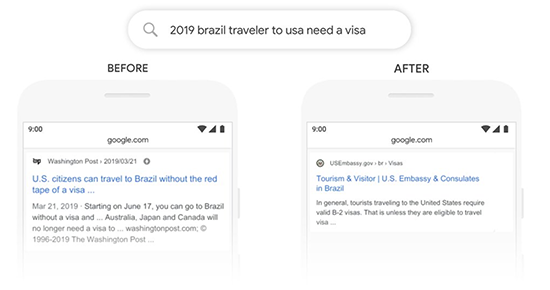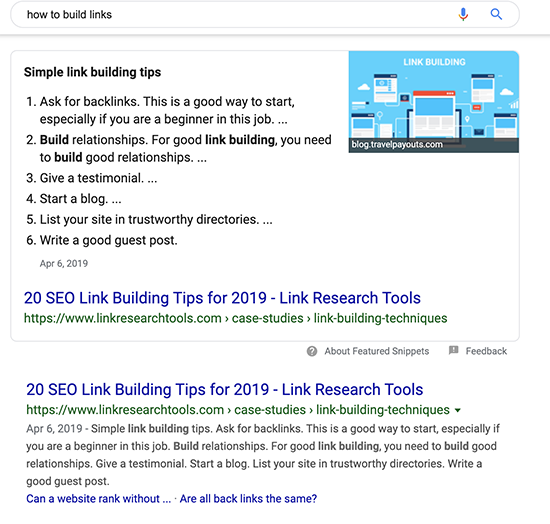All You Need to Know About Google’s BERT Update

Ever since Google has announced the BERT update, the SEO world has been polarized again. It’s spurred lots of speculation, unfounded claims lacking data, and debates between opposing opinions. It has been like a shotgun blast of information, and even for myself as an SEO professional, it’s hard to decipher fact from fiction. And for those who don’t do this on a daily basis, it’s understandable if you’d want to just throw your hands in the air and give up.
So, how are we to cut through the fog of sensationalized headlines? How does this affect you, the site owner? Does this change your SEO strategy? Will it affect rankings and website traffic?
We’ll answer all these questions for you below. And we’ll leave you with actionable tips to start plugging away at right now.
What Is BERT?
For those who haven’t yet heard the news about Google’s latest search algorithm update, I’ll give a quick overview of what it is, and how it works.
BERT is Google's latest algorithm update that incorporates brand new Natural Language Processing technology into searching. BERT stands for Bidirectional Encoder Representations for Transformers. Sounds cryptic and complicated, right?
Well, the good news is, as website owners and SEOs, we don’t need to know how it works. All we need to understand is that it’s a technology that helps Google better understand a searcher’s intent from the natural language a real person would use to search. As Google says in its briefing on BERT:
“It’s our job to figure out what you’re searching for and surface helpful information from the web, no matter how you spell or combine the words in your query. While we’ve continued to improve our language understanding capabilities over the years, we sometimes still don’t quite get it right, particularly with complex or conversational queries.”
BERTs technology allows Google to look at the context of a word within a search query, and to understand the inference of the search.
For example: "2019 brazil traveler to usa need a visa" would have returned a blog post or press release on why you need to get a visa to get to Brazil. But now, being able to better comprehend what a user wants, it would return a link to the visas page of the US Embassy website (Example given by Google.).
BERT helps Google to read between the lines.
Though BERT is only being rolled out for ~10 percent of US search queries, it marks a significant step forward in search engine technology.
Does BERT Change How We Do SEO?
Nope.
There’s no need to change the way you do SEO for BERT as long as you’ve been following best practices and principles all along. If you have a solid process for keyword research + content creation, and are seeing rankings and performance, there’s really nothing to worry about.
Though there may be quite a lot of claims and buzz around the BERT update, nothing actually changes on the website owners’ side.
Here’s a good example of an unfounded claim around BERT:
From a widely-read SEO publication — how can this claim be made with so little data available to back it up?
Reading further, we see the full truth from the head of SEO at NYT:
“But it coincided with the move to mobile-1st indexing — so we're not sure what's causing changes.”
Exactly, it’s all just speculation. Those creating content on the web should focus on writing high quality, relevant content that's backed with keyword research. Write something that will be helpful to someone asking a question via Google Search, and ignore the headlines.
For example, a few questions that this post would answer are: "Does BERT affect my SEO?" or "How should I change my SEO for BERT?"
The only thing BERT does is change what type of content is served for a given query. For example, before BERT is applied, when someone searches for “how do I pass my driver’s test,” Google may have returned a blog post of tips to pass your driver’s test. After (and if) BERT is applied, Google may return the official state driver’s requirements.
The same SEO principles of keyword research + search results research apply: When you search for a keyword that you're targeting, what type of content is ranking in the top three? Blogs? Listicles? Ultimate guides? Featured snippets or products? Then make better versions of those. BERT does not change this practice.
Looks like this listicle for “link building tips” is what Google thinks is the most helpful. A good SEO/content strategy would be to make your own, better version of this list.
Does BERT Affect My SEO in Any Way?
BERT may affect the performance of certain pages in search. Remembering the Visa example from before, the page that previously ranked #1 for the search term “2019 brazil traveler to usa need a visa” would no longer be #1. It may not even be on the first page. This is because BERT found that there was more helpful content to be served for that query.
So, if during your SEO monitoring, you see the performance of some of your pages dropping, BERT may be the culprit. You’d have to do some further research to pinpoint the problem, like this example below:
Let’s say you notice traffic to one of your listicles has dropped significantly over the past couple of months. So, you type the query into Google and find that the content ranking highest is now in the form of blog posts. Any good SEO will look at this and say “we need to repurpose this listicle as a blog post to reclaim our spot in the top five for this query.” And he’s right! BERT may have changed what type of content Google serves for this particular query, but the practice of SEO remains the same.
It’s important to remember that BERT is only being applied to 10 percent of US searches, so the likelihood of this affecting any of your pages is small though possible. And there’s no need to sound the alarms, just be sure to consistently monitor your search performance.
What Does the Data Say?
We strive to use data to inform all recommendations we make to our clients. Unfortunately, the big downside of writing an article on a Google Search algorithm update so early is that we don’t have much data. It takes a while to collect enough data and aggregate evidence pertaining to how BERT has affected website traffic to make any clear conclusions.
What we do have, however, is a deep understanding of SEO and how it plays with Natural Language Processing. Britney Muller, an SEO analyst at Moz, gave some really great insights into this in her blog “Whiteboard Friday” which echo our recommendations:
So, even though we don’t have hard data telling us “this is how BERT has changed search,” we can draw some solid logical conclusions to predict what we need to know. The bottom line is that we as website owners and SEOs need to focus on giving users what they want in a helpful way.
Life After BERT
Applying a Natural Language Processing technology like BERT to query comprehension is an amazing innovation. It will certainly benefit users as this begins to roll out for more and more queries.
However, as far as SEO is concerned, there’s nothing we’re able to or need to change. The core principles apply the same as they did before BERT was released.
While the polarizing headlines of the SEO world continue to cause sleep loss, you can rest assured in your strategy by following these practices:
Write great content backed by keyword research: What questions are people searching for that you can answer? There are lots of tools you can use to find questions that people are searching in Google, like answerthepublic.com or by typing in question words into the Google search bar. Then, confirm the value of these keywords by cross-referencing with a tool like Moz, researching search volume and competition.
Ensure that your answers are in the content type users are expecting: Once you’ve found your valuable keywords, go ahead and search for them. What type of content are you seeing? Sometimes, Google serves ‘ultimate guides’. Sometimes, ‘listicles.’ And sometimes plain old blog posts. This is called user intent. Whatever type of content is being served, we know that’s what will rank on the first page. So, that’s the type of content we need to create to answer our question keywords we found.
Monitor the performance of your pages: Using a keyword tracking tool, Google Search Console, and Google Analytics, consistently check-in on your site’s performance in organic search. This is the only way to spot if BERT has affected any of your pages. BERT or not, this is something that should be done on a monthly or bi-weekly basis.
As you can see, you’re still creating great content. You’re still doing keyword research. You’re still analyzing and capitalizing on your competitor’s tactics. You’re still consistently monitoring the performance of your pages in Search. This update is nothing but an episode in a long series of algorithm changes in the last decade, none of which have changed the core principles of good SEO.
So let’s celebrate, not fear BERT, and keep giving users what they want in a smart way.





